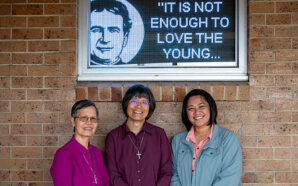A coalition of refugee organisations has condemned the federal government’s decision to slash support to people seeking asylum in the 2020-21 Budget. This decision, they say, puts over 100,000 people, including around 16,000 children, at further risk of homelessness and destitution.
The organisations, which represent a coalition of over 200 others, have been running the Nobody Left Behind campaign since May this year. The campaign has repeatedly called for ongoing support to be provided to 100,000 people seeking asylum who have been left without lifelines during the COVID-19 pandemic and subsequent economic fallout.
The budget, handed down on Tuesday 6 October, however, not only failed to provide support during this time of crisis, but halved the existing amount allocated for support for this group. This indicates that more people will be excluded from support and left without a safety net over the coming 12 months.
The Federal Government’s recent decision to release people brought to Australia for medical care into the community, cutting them off from support in the process, is an indication of this, already increasing this cohort by 500 people. They are now expected to find work in the middle of a recession, despite many having ongoing serious health issues, a lack of professional networks and/or a low level of English, having been denied access to English language programs.
People seeking asylum are ineligible for JobSeeker and JobKeeper and many were cut off from the SRSS payment when the government changed the eligibility criteria in 2018. Thousands have lost work since the start of the pandemic, particularly given they are largely employed on temporary and casual contracts in heavily impacted industries, such as hospitality. Excluded from most federal government support, many have relied on charities and others in their community to eat and pay the rent. Crucially, many have only been able to maintain property rentals thanks to state and territory moratoriums on rental evictions, which have recently ended in most of Australia.
Service providers across the country have reported at least a 300% increase in the need for emergency food and rental relief for people seeking asylum since the pandemic began. This demand has only increased as time has passed.
Even in states which have maintained a low level of virus transmission, the demand has continued to grow as people have been unable to regain former employment, with charities unable to sustain the level of need. Emergency relief committed by state and federal governments falls short of providing people with the support needed to pay for rent and food until the crisis passes.
A recent report predicted that almost 19,000 refugees and people seeking asylum would lose their jobs in the course of the economic downturn, and that unemployment in this cohort would double. The report predicted that as a result, 14,000 people seeking asylum would become homeless. The report outlines significant social and economic costs for the country as a result, including a potential bill of $200 million/year for state governments. With fresh cuts announced last night, the number of people affected will only increase.
Below are some comments from different refugee organisations
Paul Power, CEO of the Refugee Council, said: “Australia is at risk of an impending homelessness crisis, which the Federal Government has failed to prevent. Since the pandemic hit, we – and many others – have repeatedly warned our political leaders of the impact that this is having on refugees and people seeking asylum. Emergency relief, which only equates to a very small amount per person, is a paltry substitute for the ongoing support desperately needed by these people – including many families with children. This is a serious abrogation of the Federal Government’s responsibility to provide for vulnerable members of our society at this time of need.”
Carolina Gottardo, Director of the Jesuit Refugee Service (JRS) Australia said: “This budget does nothing to keep people seeking asylum safe, help them get back on their feet, or support them to re-enter the job market. These families and individuals have waited years for their protection claims to be processed, and have worked and paid taxes while waiting.
“Yet by deliberately excluding these women, children, and men from any financial support whatsoever during a pandemic and a recession, the Federal Government is manufacturing further homelessness, hunger, and ill-health amongst this group of people. In the absence of systemic support, NGOs such as Jesuit Refugee Service (JRS), parishes, schools, and diaspora groups are doing our best to fill the gaps. But we are stretched to breaking point. We cannot continue to do the Federal Government’s job for it endlessly.”
Frances Rush, CEO of the Asylum Seekers Centre said: “How can someone feed their children, keep their phone connected or a roof over their head without a regular income? People want to work and support themselves but when the jobs have disappeared and there is no Federal Government payment available, people are quickly falling into crisis. Homelessness is on the increase and a one-off emergency relief payment does not prevent destitution. People seeking asylum are part of our community and they deserve our support.”
Centre Director and Principal Solicitor Sarah Dale of the Refugee Advice and Casework Service said: “This Government has shown time and time again that it would rather spend millions of dollars denying the rights of people seeking asylum, than spend less: and give them the support they need. Even during a pandemic. Men, women and children are facing very real destitution and if this crisis is not addressed, we will not only be denying them of their most basic human rights, but we will face huge social and economic costs as a result.”
Aleem Ali, CEO of Welcoming Australia, said: “People on temporary visas, including people seeking asylum, international students and workers on temporary visas, have been left without a safety net and are relying on the goodwill of local councils, state governments, community organisations and generous individuals to continue to pay their rent and put food on their table. Community organisations and support organisations are struggling to meet the overwhelming number of requests for emergency relief support. If, as Australians, we are about a fair go for all – where we draw the line is at the point where no one is left behind.”
Jana Favero, Director of Advocacy and Campaigns at the Asylum Seeker Resource Centre, said: “People seeking asylum have been fully reliant on charity to survive the pandemic and recession for six months now, and the crisis is deepening. The Asylum Seeker Resource Centre has seen a 400% increase in people needing emergency relief, families and children are especially out in the cold because the Morrison Government is refusing to recognise they need support in this crisis no matter their visa status. People have lived and worked in our communities for up to eight years, and have the potential to contribute to economic recovery, if only they could have a safety net like everyone else, as we all get back on our feet.”
David Burke, Legal Director, Human Rights Law Centre, said: “Every person, including refugees and people seeking asylum, deserves to be safe during this pandemic and the resulting economic crisis. The Federal Government is deliberately plunging families, men, women and children into poverty, and leaving them to face this unprecedented time without any real safety net.”
Shabnam Safa, Chairperson, National Refugee-led Advisory and Advocacy Group, said: “Refugee communities are one of the hardest hit groups in this pandemic. Our community holds grave concerns, particularly for those on Bridging Visas and Temporary Protection Visas, who are left without the most basic financial and health support to get through this crisis with crippling uncertainty. Cutting the limited support available to this vulnerable group is not only immoral and irrational, it will also lead to further social, economic and psychological costs for an already struggling community.”
With thanks to Jesuit Refugee Services.








